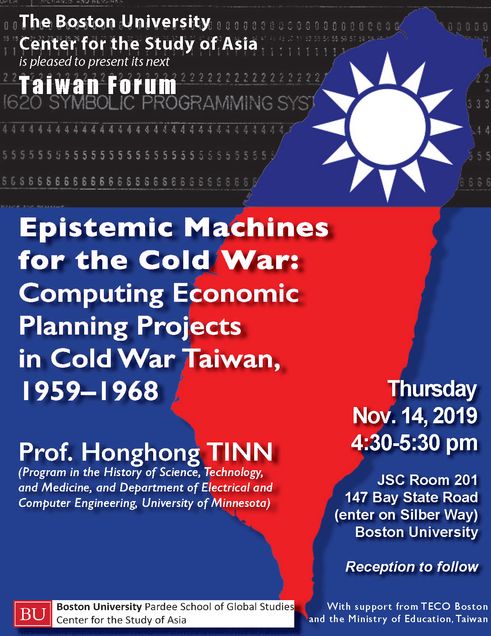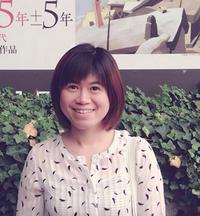BUCSA Taiwan Forum: Epistemic Machines for the Cold War: Computing Economic Planning Projects in Cold War Taiwan, 1959-1968 (Nov. 14, 2019)
The BU Center for the Study of Asia’s Taiwan Forum lecture series
is pleased to present the lecture
Epistemic Machines for the Cold War: Computing Economic Planning Projects in Cold War Taiwan, 1959-1968
Prof. Honghong Tinn
(Program in the History of Science, Technology, and Medicine, and Department of Electrical and Computer Engineering, University of Minnesota)
Thursday, Nov. 14, 2019 from 4:30-5:30 pm
at JSC Room 201, 147 Bay State Road (entrance on Silber Way),
Boston University, with a reception to follow.
The Taiwan Forum lecture series is supported by a grant from the TECO Boston Office and the Taiwan Ministry of Education.

Abstract:
This talk traces the process in which Taiwanese economic bureaucrats, a Cornell economics professor, and pioneering computer users worked together to visualize, represent, and make sense of economic activities in Taiwan through inter-industry input-output tables. A Cornell econometrician, Ta-Chung Liu (1914–1975) visited Taiwan in 1964 to help develop an economic-planning project for a Taiwanese government agency, the Council for International Economic Cooperation and Development. Liu worked on producing inter-industry input-output analyses of Taiwanese industries by using one of the first two available electronic digital computers in Taiwan. It was an IBM 1620 mainframe, installed at a Taiwanese university in 1964 through a United Nations technical-aid program. This talk highlights three ways in which the computer power and geopolitics are inseparable. First, it unpacks the participation of Taiwanese historical actors at the frontlines of Cold War economic competition between Taiwan and China. Second, this talk reveals how U.S. and UN aid provided the necessary technological resources for relevant econometric calculations. Finally, the mutual reliance between economic planning and electronic digital computers is illustrated in the constant adjustment of inter-industry tables to the capacity of available computers for its arduous calculation and interpretation of incomprehensible data. In sum, this talk elaborates on the critical role of computing technology during the Cold War, especially in an East Asian geopolitical context.
About the Speaker:
 Honghong Tinn is a historian of information technology and received her Ph.D. in Science & Technology Studies from Cornell University. Before joining the University of Minnesota, she held fellowships and academic positions at the Max Planck Institute for the History of Science, Berlin, Germany, the National University of Singapore, and Earlham College. Her research interests are in the areas of the history of digital electronic computing, Cold War, econometrics, and science, technology, and medicine in East Asia. Her book manuscript, Island Tinkerers: Emulation, Innovation and Transformation in the Making of Taiwan’s Computing Industry, explores the transnational exchanges of computing technology and expertise between Taiwan and the United States. She especially emphasizes the agency exercised by local Taiwanese engineers, scientists, technocrats, and computer users in bringing computing technology to and popularizing such technology in Taiwan. She is an elected member of the Executive Council of the Society for the History of Technology (2017-2019) and has chaired the International Small Grants Committee since 2017. She is currently an advisory editor for Engineering Studies and on the editorial board of East Asian Science, Technology and Society: An International Journal (Duke University Press).
Honghong Tinn is a historian of information technology and received her Ph.D. in Science & Technology Studies from Cornell University. Before joining the University of Minnesota, she held fellowships and academic positions at the Max Planck Institute for the History of Science, Berlin, Germany, the National University of Singapore, and Earlham College. Her research interests are in the areas of the history of digital electronic computing, Cold War, econometrics, and science, technology, and medicine in East Asia. Her book manuscript, Island Tinkerers: Emulation, Innovation and Transformation in the Making of Taiwan’s Computing Industry, explores the transnational exchanges of computing technology and expertise between Taiwan and the United States. She especially emphasizes the agency exercised by local Taiwanese engineers, scientists, technocrats, and computer users in bringing computing technology to and popularizing such technology in Taiwan. She is an elected member of the Executive Council of the Society for the History of Technology (2017-2019) and has chaired the International Small Grants Committee since 2017. She is currently an advisory editor for Engineering Studies and on the editorial board of East Asian Science, Technology and Society: An International Journal (Duke University Press).
Her recent publications include:
Review of Mar Hicks, Programmed Inequality: How Britain Discarded Women Technologists and Lost Its Edge in Computing (Cambridge, MA: MIT Press 2018), Technology and Culture, Forthcoming.
“Making Community Legible, 2012-2018” East Asian Science, Technology, Society 13, no. 1 (2019): 5-6.
“Modeling Computers and Computer Models: Manufacturing Economic-Planning Projects in Taiwan, 1959-1968,” Technology and Culture 59, no. 4 (October, supplement issue, 2018): 66-99.
“Charting the Cartography of a Global Community of EASTS Scholars,” East Asian Science, Technology, Society 10, no. 4 (2016): 341-342.
“From DIY Computers to Illegal Copies: The Controversy Over Tinkering with Microcomputers in Taiwan, 1980-1984,” IEEE Annals of the History of Computing 33, no. 2 (2011): 75-88.
“Cold War Politics: Taiwanese Computing in the 1950s and 1960s,” Think Piece column, IEEE Annals of the History of Computing 32, no. 1 (2010): 92-95.
For additional information, see https://www.hstm.umn.edu/faculty/honghong-tinn-1

IBM Archives: customer engineers were photographed in 1963 while assisting the Council for United States Aid in relocating its data processing center to a new site on Roosevelt Road in Taipei.